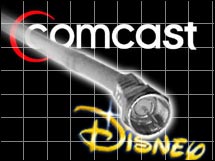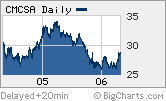It's Comcastic
The cable giant touts its VoIP and Internet offerings but shares of Comcast have been stuck in a rut. That may soon change.
NEW YORK (CNNMoney.com) - Cable giant Comcast has a new ad campaign poking fun at digital subscriber line (DSL) Internet services offered by major phone companies. The commercials feature two turtles known as the Slowskys who are DSL customers. For Comcast shareholders, though, these commercials may strike a nerve. The company may be proud of its lightning-fast Internet service but that hasn't benefited investors: Shares of Comcast (Research) have been moving at a tortoise-like pace for the past few years.
Sure, the stock is up about 11 percent so far this year (by comparison, the S&P 500 is up 4.3%). But that follows a 22 percent decline in 2005 and a gain of just 1.5 percent in 2004. Investors have been concerned during the past few years about the threat from satellite television companies DirecTV (Research) and EchoStar (Research). More recently, some investors have expressed worries about phone companies like Verizon (Research) starting to enter the video market. But some analysts and fund managers think that the stock's recent strong performance is a good sign and that Comcast's shares may soon be ready to head off to the races. High hopes for VoIP
The company is set to release its first-quarter results on Thursday morning and Wall Street is hopeful that the company will report solid subscriber gains for its so-called triple play group of products: high-speed Internet, digital cable and Internet phone. "Investors have shifted from nervousness about telecoms getting into video to the fact that cable companies are already providing voice, video and data," said David Joyce, an analyst with Miller Tabak. Analysts are most interested to see how well the company's voice over Internet protocol(VoiP) business is doing. Matthew Harrigan, an analyst with Janco Partners, thinks the company may have added more than 250,000 VoIP customers during the quarter. "There is hyper-growth in the voice business," he said. Of course, Wall Street still wants proof. If Comcast does report solid first-quarter subscriber increases in emerging businesses like VoIP and high-speed Internet access, that could go a long way toward lessening investor fears about increased competition. "People want to see that cable companies are already taking away market share in the phone business before the phone companies can take video share," said Joyce. Acquisition fears linger
Still, even if the company reports solid first-quarter subscriber gains, some are concerned that Comcast may look to make a large acquisition that could hurt the stock price. Comcast and Time Warner (Research), the nation's second-largest cable company, have teamed up to buy the assets of bankrupt cable operator Adelphia and that deal is scheduled to close in July. (Time Warner also owns CNNMoney.com.) Most on Wall Street are in favor of the Adelphia purchase. But when that purchase is completed some fear Comcast could look to make another run at a big media company, a deal that may be not in the best interest of shareholders. After all, it's been about two years since Comcast made (and subsequently dropped) its surprise, unsolicited bid for Walt Disney (Research). "After the Disney move a few years ago, people are still leery about what Comcast is going to do to in the content area," said James McGlynn, manager of the Summit Everest fund. McGlynn said Comcast, which already owns cable networks E! Entertainment Television, Style Network, the Golf Channel and OLN (soon to be renamed Versus), may be looking to make a purchase in order to bulk up its programming. McGlynn said he sold his stake in Comcast earlier this year following the stock's run-up. But Harrigan said he doubts that CEO Brian Roberts is interested in targeting another major media firm. He points out that a Disney deal was a unique opportunity that could have made sense for Comcast because of the importance of Disney's ESPN network to Comcast's cable systems. Plus, the bid came at a time when Disney was vulnerable - before the ratings turnaround at Disney-owned ABC and as dissident shareholders were calling for the head of former CEO Michael Eisner Scott Black, manager of the Delphi Value fund, whose portfolio includes Comcast, said other major media companies either aren't likely to sell or wouldn't be as good a fit...and Roberts is smart enough to know that. "Roberts is savvy and credible. Disney was a one-off situation," said Black. "There's not a lot out there in media for sale. Comcast's not going to buy News Corp., Viacom or CBS." Tuning into a cheap stock
With that in mind, Black thinks the stock is a good value. And analysts are predicting fairly solid growth for the company over the next few years. According to estimates from First Call, analysts are forecasting a 10 percent increase in earnings before interest, taxes, depreciation and amortization (EBITDA) this year and a 12 percent increase in EBITDA in 2007. EBITDA is often used as a barometer of profitability for cable and other media companies because of high upfront costs. Yet the stock, despite its recent upward move, trades at just nine times 2006 (EBITDA) estimates. This multiple is near the low end of historical valuations for cable companies, which makes Comcast a compelling buy, according to Black. "The real growth here is from the high-speed and phone businesses," he said. "The company can legitimately grow operating cash flow over the next few years by about 9 percent to 12 percent. This is a good business and the stock's cheap." William Fries, manager of the Thornburg Value fund, which owns Comcast shares, agrees. He thinks the company has the most significant opportunity to attract customers interested in video, phone and Internet services thanks to its triple play of products. "Comcast is sitting in the right spot. The company is in a position to win. That, along with the valuation, makes it a good bet," he said. ----------------- Comcast tells telecoms to bring it on. Click here. Will video save the telephone star? Click here. Analysts quoted in this story do not own shares of the companies mentioned and their firms have no investment banking ties to the companies.
The reporter of this story owns shares of Time Warner through his company's 401(k) plan. |
| |||||||||||||||||||||||




